Mieke Lippstreu had just moved to Denver when she met Ramen.
The ginger tabby was clearly comfortable with people, crawling on Lippstreu’s lap and appearing at her door throughout the day. But there was something wrong with Ramen, whose mouth was covered in discharge and, unable to groom himself, smelled sickly.
Asking around, Lippstreu discovered that Ramen was a community cat, cared for primarily by a neighbor named Manuel.

Mieke Lippstreu and a neighbor named Manuel teamed up to find care for Ramen, a neighborhood cat in need.
“Ramen wouldn’t be alive if it wasn’t for my neighbor Manuel,” Lippstreu said. “I chatted to Manuel about it, and I said, ‘I’m wondering if there’s something we can do for Ramen?’ And that’s when he explained to me, ‘I’ve tried and I haven’t been able to actually get him the care that he needs other than a couple of antibiotics periodically.’”
The pair teamed up, determined to find care for Ramen. Visit after visit, Lippstreu and Manuel struggled to find affordable treatments. By the time a friend suggested visiting the Dumb Friends League at CSU Spur, Ramen had severe dental disease and a painful skin condition.
“We tried a number of different places, and it took a minute,” Lippstreu said. “It was tough trying to find affordable veterinary care. Over the course of the time that we were looking, I was becoming increasingly desperate and spending a good chunk of the day out on the porch just with Ramen on my lap.”
But there, at the low-cost, subsidized medical center, Ramen quickly received dental surgery and treatment for his ailments — a relief that brought Lippstreu to tears.
“I will never forget when we were there,” Lippstreu said. “I just started crying because this is the first person who actually sees how much suffering this animal is experiencing and is willing to do whatever they can to try and alleviate that suffering.”

Ramen, left, a neighborhood cat that had his teeth removed at the Dumb Friends League Veterinary Hospital at CSU Spur due to a case of stomatitis, a condition that caused painful sores inside his mouth, sits in the sun under a bush with his constant companion, a gray female named Habibi, on Thursday, Dec. 7, 2023, in Denver, Colo.
Once on the mend, Lippstreu brought him home with a new lease on life. Ramen is now a true indoor/outdoor cat, coming in on occasion during the day and spending nights inside Lippstreu’s home for safety, since he had to have his teeth extracted.
“It was beautiful to see, once his teeth were gone, he started becoming himself, not just a cat in debilitating pain,” Lippstreu said.
Unfortunately, Ramen’s story isn’t unique at the Dumb Friends League. The clinic opens at 7 a.m. By 7:30 a.m., the clinic is full and must turn people away. Scrambling vets and technicians work through the day performing surgeries, covering everything from dental procedures to mass removals. The spay and neuter clinic works on 45-50 cats each day.
“There’s definitely a need for veterinary care. ... We have clients that come from outside of Denver metro looking for more affordable veterinary care,” said Dr. Sara Odin, a veterinarian at Dumb Friends League. “As things have become more expensive in this economy, people that are having a hard time paying their bills want to do the right thing by their pet.”
Across the country, access to veterinary care is an issue. Here in Colorado, it’s no different. Recent surveys among professionals in the field, as well as input from experts and pet owners, have found that Colorado veterinarians are strained for time and funds.
“There’s a veterinary shortage and this is not just in Colorado. It’s at least nationwide, if not worldwide,” said Rachel Heatley, director of advocacy at Dumb Friends League, part of the Vet Care Coalition. “But in Colorado, it’s particularly odd, because we have one of the top veterinary schools in the world here, and we still don’t have enough veterinarians.”

Registered vet tech Suzanne Speer lays a young female cat down while prepping her to be spayed on Dec. 1 at the Dumb Friends League Veterinary Hospital at CSU Spur in Denver, Colo.
The Vet Care Coalition, based out of Denver, is an alliance among more than a dozen animal welfare organizations like the Pikes Peak Humane Society and the ASPCA, veterinary professionals and pet owners. Their goal: find solutions to Colorado’s veterinary workforce shortage. By 2030, the Vet Care Coalition expects 75 million pets to be without care across the U.S. “What we’ve been talking about with a lot of data is, when exactly are we going to run out of veterinarians? When exactly is it that the need is going to be so much greater than what can be provided?” Heatley said. “Right now, we’re already hitting that, and by 2030, that’s supposed to be pretty much out of control.”
The problem
While Colorado veterinarians have different ideas on how to address the problem, most agree: access to veterinary care is an issue.
The Humane Society of the Pikes Peak Region told The Gazette it has not been able to offer services to the public at the levels it would like due to increased difficulty in hiring veterinarians.
West Side Animal Hospital in Colorado Springs animal hospital said it must deny potential new clients daily because there is no availability among its veterinarians, who have had to work through lunch lately to meet demands of emergency surgeries.
“We receive so many calls every day from potential clients that we are unable to add to our schedule. I know for certain that the public is just as frustrated as we are,” an email from the clinic reads.
That dilemma — having to deny new clients weekly or more often — is being experienced by more than 70% of veterinarian offices across the state, according to a survey completed by CSU Animal-Human Policy Center.

Veterinarian Kasey Sweeney spays a cat on Friday, Dec. 1, 2023, at the Dumb Friends League Veterinary Hospital at CSU Spur in Denver, Colo. (Timothy Hurst/Denver Gazette)
The survey, sent out to all 5,758 registered veterinary professionals in Colorado, included doctors of veterinary medicine, technicians and practice owners and managers. Just under 750 veterinary professionals responded. The survey was completed at the request of Gov. Jared Polis.
“We know that most pet owners see their pets as family members and so really, when someone can’t get access to care for their pet, it really influences people in addition to animal welfare,” said Rebecca Niemiec, director of the university’s new Animal-Human Policy Center, which completed the survey.
While the whole state is vulnerable to this problem, there are regions with higher need.
“Rural areas of Colorado, namely in the southern half and southeastern corner struggle greatly with access to veterinary care due to the sheer shortage of practices and staff in these areas, not only general/wellness medicine but especially emergency medicine,” said one survey respondent.
It’s not just a shortage of veterinarians. Clinics are lacking in vet techs, too.
The CSU survey found that 78% of veterinarians and practice managers agreed that veterinary technicians are difficult to find, despite being important to the practice. In fact, practice managers reported that almost twice the number of technicians they currently employ would be ideal.
“Veterinary professionals want ways to keep technicians in clinics. They want ways to recruit and retain technicians and make sure that they have career opportunities and also that they’re engaging in tasks in the clinic that are really helping, to make sure they can bring on clients and provide the care that they want to,” Niemiec said.

Registered vet tech Suzanne Speer looks on as a young female cat receives anesthesia while prepping her to be spayed on Friday, Dec. 1, 2023, at the Dumb Friends League Veterinary Hospital at CSU Spur in Denver, Colo. (Timothy Hurst/Denver Gazette)
Perhaps the most disheartening part of the problem: Animals are suffering.
Seventy-two percent of veterinarians and technicians reported in the CSU survey that they had to euthanize an animal in the past year because the owner couldn’t afford the treatment.
“I think a really important point here is a different decision would have been made if the client had sufficient financial resources,” Niemiec said. “The euthanasia of animals is occurring because the owners can’t afford care.”
Why?
Experts point to several reasons for the current situation.
“We don’t have enough veterinarians. The ones that are working are completely overworked and exhausted. Vet techs are few and far between and also working to the bone and exhausted. So it’s just a perfect storm of decreasing access to care overall,” Heatley said.
A big part of the problem: burnout.

Veterinarian Rose McDonough checks and cleans the teeth of a Chihuahua on Friday, Dec. 1, 2023, at the Dumb Friends League Veterinary Hospital at CSU Spur in Denver, Colo. (Timothy Hurst/Denver Gazette)
Vet techs and veterinarians alike are suffering from burnout due to increased demand and strained resources, as well as the mental toll of the job. According to the CSU survey, not being able to provide access to care for all patients affects the majority of veterinary professionals’ mental health, especially among those who have had to euthanize an animal due to cost barriers.
“Vet techs in the field only last about five to seven years before they kind of get burned out due to low pay, large workloads, and a lot of times they just kind of move on to human medicine to make more money but still use their skill set,” Heatley said.
Another contributing factor is the shift in how people view their pets and overall population growth in Colorado, Heatley said. The number of veterinarians hasn’t been able to keep up with pet ownership.
“There’s an increased view of the pet in the family. People give more esteem to pets than they did in the past, which is awesome, but fuels a need for veterinarians, which we cannot graduate fast enough,” Heatley said.
The cost of veterinary schooling is a limiting factor, and loan repayment programs in the state are often underutilized, Heatley said.

Veterinarian Jessie Holley performs both a mast removal and neuters a Great Dane on Friday, Dec. 1, 2023, at the Dumb Friends League Veterinary Hospital at CSU Spur in Denver, Colo. (Timothy Hurst/Denver Gazette)
In turn, high veterinary costs are a major deterrent for pet owners. The U.S. Department of Labor Consumer Price Index shows that between 1997 and 2022, the cost of veterinarian services steadily rose at almost twice the rate of inflation. Through 2021 and 2022 alone, the nation’s veterinary shortage contributed to service prices increasing by more than 13%.
Practices seem to agree, while this concern has been growing for many years, it was exacerbated by the pandemic, when practices saw a significant increase in demand for their services and decreased capacity.
Solutions
While the scope of the issue is daunting, experts are working on solutions.
Several policy changes have been suggested among veterinary professionals, including expanding telehealth, offering loan repayment programs for vet techs as well as defining their capabilities, allowing midlevel veterinary practitioners to practice and grant programs.
There’s a big push to allow veterinarians to establish care for a new patient via telehealth. Colorado currently requires an in-person exam for new patients, but other states, including Arizona and California, have been successful in passing legislation allowing this to be done remotely.
The CSU survey found that veterinary professionals have mixed feelings on the potential legislation — 43% of respondents believed passing this in Colorado would have a positive impact on the profession, while 39% said it would have a negative impact.

Registered vet tech Suzanne Speer lubricates the eyes of a male stray as he’s prepped to be neutered on Friday, Dec. 1, 2023, at the Dumb Friends League Veterinary Hospital at CSU Spur in Denver, Colo. (Timothy Hurst/Denver Gazette)
However, just over half agreed that the ability to establish a veterinarian-patient relationship through telemedicine would increase the amount of care that they could provide.
“When people live in (a) veterinary desert, or they live in areas where they can’t get into a veterinarian, but maybe a veterinarian in another part of Colorado has more availability, we want telehealth to be an option,” Heatley said.
Veterinarians also seemed to be split about allowing midlevel practitioners like veterinary professional associates to practice, according to the CSU survey, with about half believing that it would positively benefit the profession and increase access to veterinary care. But there is hefty support from Colorado pet owners, with two out of three supporting the idea of a new midlevel practitioner, according to the Vet Care Coalition.
Veterinary professional associates are similar to physician assistants in human medicine. The profession requires a master’s degree, and works under the supervision of veterinarians. They can provide care like routine examinations, diagnosing minor conditions and performing small surgeries.
There are also different ideas on how to lower the cost of care, including vouchers, credit lines and grants. The CSU survey found the 69% of veterinary professionals would be interested in participating in grant programs focused on increasing veterinary service for underserved populations.

Ramen, center, a neighborhood cat that had his teeth removed at the Dumb Friends League Veterinary Hospital at CSU Spur due to a case of stomatitis, a condition that caused painful sores inside his mouth, gets a scratch from Mieke Lippstreu, who organized the vet care and has given Ramen a warm home to sleep in and administers his daily medications, while hanging out with his constant companion, a gray female named Habibi on Thursday, Dec. 7, 2023, in Denver, Colo. (Timothy Hurst/Denver Gazette)

Ramen, a neighborhood cat that had his teeth removed at the Dumb Friends League Veterinary Hospital at CSU Spur due to a case of stomatitis, a condition that caused painful sores inside his mouth, hangs out in the yard with Mieke Lippstreu, who organized the vet care and has given Ramen a warm home to sleep in and administers his daily medications, on Thursday, Dec. 7, 2023, in Denver, Colo. (Timothy Hurst/Denver Gazette)
One more idea that arose throughout surveys is loan-repayment programs for vet techs, as well as more clearly defined duties.
There’s also some good news: More programs are opening up.
Pikes Peak State College is currently accepting applications for its new veterinary technology program, which it announced in October. The two-year program is set to launch in the spring and is designed to help meet the growing needs of the veterinary workforce, said department chair Regina Reyes, who has worked in the field for 36 years as a vet tech.
“We needed to have some type of facility here,” Reyes said. “I would love to see all of those people who always wanted to work with animals and basically could not afford it be able to go for that dream now because you can actually go to the state college.”
As for Lippstreu and Ramen, the duo are thriving. Lippstreu looks forward to many years ahead with Ramen, thanks to the Dumb Friends League.
“We have no idea how old he is. He may be a little old man, but he plays like he’s a kid,” Lippstreu said.
“It’s just so beautiful to see this cat who literally looked like he was on death’s door now running around and chasing a ribbon throughout the house.”


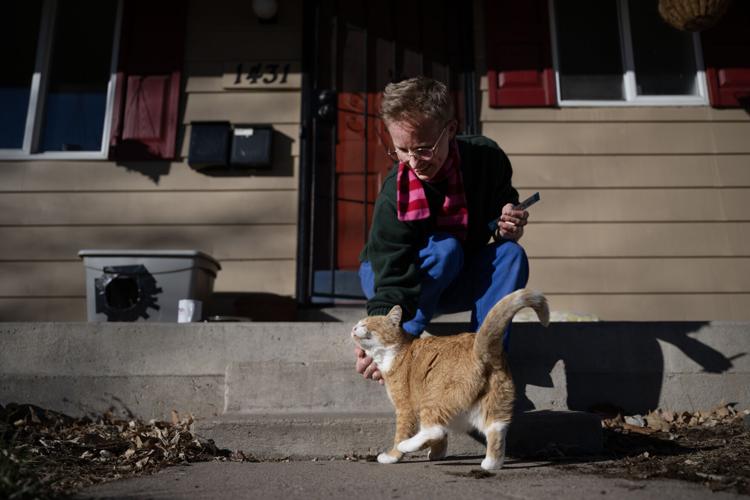
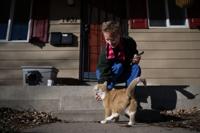
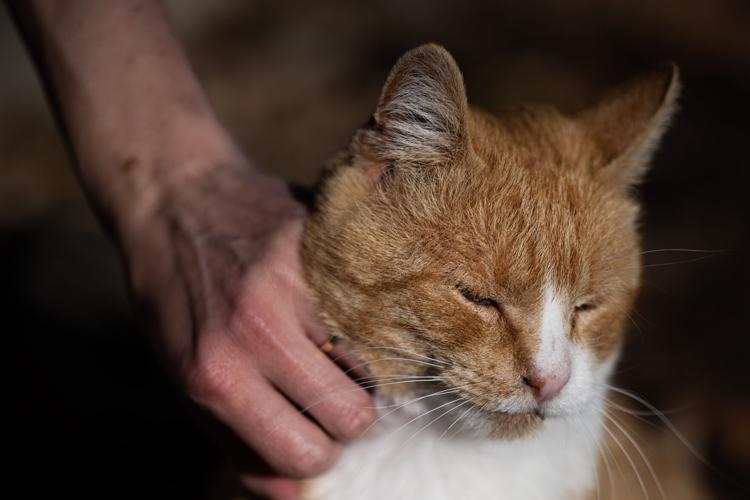
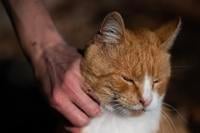

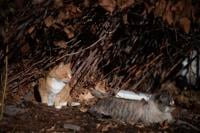

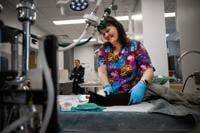

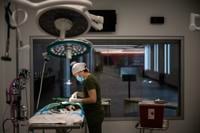





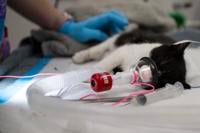

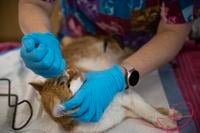

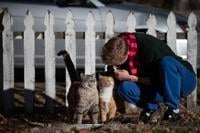

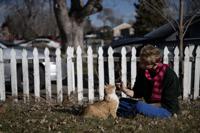
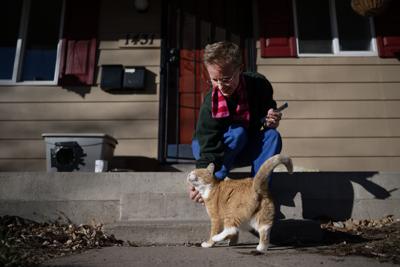
 Your Privacy Choices
Your Privacy Choices